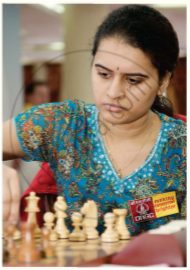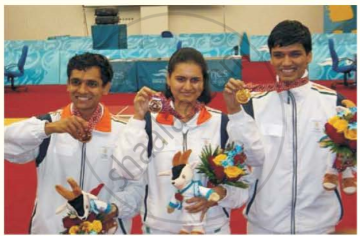Advertisements
Advertisements
प्रश्न
Give two example of trees that have a number of uses in everybody’s life.
उत्तर
The two uses of trees are
- Sandalwood tree gives sandal that is Considered, Sacred in rituals, worships etc. It gives wood, timber etc. It provides shade to humans, animals and most importantly snakes. It gives fragrance.
- Coconut tree gives a very juicy sweet fruit. Its coir is used to make ropes etc. We get timber from it.
APPEARS IN
संबंधित प्रश्न
Answer the following with reference to the story.
“Sure they had a teacher, but it wasn’t a regular teacher. It was a man.”
- Who does ‘they’ refer to?
- What does ‘regular’ mean here?
- What is it contrasted with?
Why does the author say that Iswaran seemed to more than make up for the absence of a TV in Mahendra’s living quarters?
Answer these question in one or two sentences . (The paragraph numbers within brackets provide clues to the answer.)
When did she leave home for Delhi, and why?
Avik, a correspondent for his school magazine, interviews Grandmaster Koneru Bumpy. Let us read :
INTERVIEW WITH KONERU BUMPY
Avik : Good morning, Ma'am! Congratulations on your achievements in the World Grand Prix Women's Chess Championship in Istanbul recently!

Koneru Humpy : Thank you! This is my biggest win in the women's circuit. This is very significant, considering that it has come in an event which had three former world champions.
Avik : Indeed! Please tell us something about yourself, Ma' am!
Koneru Humpy : I was born in Gudivada, near Vijaywada, in Andhra Pradesh on March 31, 1987. I was originally named 'Humpi' {which means champion) by my father Mr Koneru Ashok, who later changed the spelling to Humpy, to give the nrune a Russian flavour. I write my family name , Koneru, before my given name, as is the convention with the Telugu speaking people. I started playing chess when I was 5 years old.
Avik : Who introduced you to the game?
Koneru Humpy : My father acquainted me with the game. He is also my first coach. I first showed interest at the age of 6 years, when I watched him play a game and suggested a move. Indeed it was the move that actually got me into the game.
Avik : Your father left his teaching profession to make you a champion !
Koneru Bumpy : Yes, when I took the 4th place in the Indian Under 8 Championship in 1995, he decided to leave his career and dedicate his time to me.
Avik : And you had won four World Championship at a very early stage.
Koneru Bumpy : Yes, the World Girl Under 10, the World Girls Under 12, the World Girls Under 14 and World Girls Junior Chrunpionships. I acquired my IM title in 1999 and in May 2002, I achieved my 3rd GM Norms in Elekes Memorial Grandmaster Tournrunent in Budapest.
Avik : You held the record from 2002 to 2008 for the youngest woman ever to become a grandmaster!
Koneru Bumpy : Yes, I achieved it at the age of 15 years, 1 month, 27 days, beating Judit Polgar's previous record by 3 months; which was later lost in the Women's World Chess Championship in 2008 to Hou Yifan. I won the World Junior Girls Chess Championship in 2001 and won the edition or North Urals Cup, the Women's Super Tournrunent held in Krasnoturinsk. In 2006, I participated in the Women's World Chess Chrunpionship, but my crunpaign had to end early in the second round. I played in the first board of Monte Carlo Chess Club and won the last two editions of the European Club Cup.
Avik : You have got some awards also !
Koneru Humpy : Yes, Arjuna Award in 2003, Padmashri Award in 2007 and Raja-Lakshmi Award in 2008.

Avik : In India, many young chess players are ready to take a break in education and are fully focussed on chess preparations. What are your views?
Koneru Humpy : I don't think that taking up chess as a career and completely neglecting studies will be necessary at an earlier stage. After getting to a certain level in the game, they themselves should decide their preferences i.e. whether to play seriously or not.
Avik : What advice would you offer to parents of enthusiastic and talented chess children?
Koneru Humpy : Parents should not compel children to play chess. If children are genuinely interested in the game, they should encourage them. But they shouldn't hurry to get results.

Avik : How often do you exercise? Do you think daily physical exercise can help a chess player to cope with the pressure and increase the brain's ability to concentrate?

Koneru Humpy : I spend around one hour per day on physical exercise. Exercise is a must for every chess player. As the proverb says, 'a sound mind in a sound body'. Exercise shows a lot of impact on the brain.
Avik : Thank you for talking to me and giving valuable advice.
Koneru Humpy : Thank you.
Old Kaspar took it from the boy,
Who stood expectant by;
And then the old man shook his head,
And,with a natural sigh,
"Tis some poor fellow's skull," said he,
"Who fell in the great victory.
"I find them in the garden,
For there's many here about;
And often when I go to plough,
The ploughshare turns them out!
For many thousand men,"said he,
"Were slain in that great victory."
Read the lines given above and answer the question that follow.
What did Kasper say?
We will ponder your proposition and when we decide we will let you know. But should we accept it, I here and now make this condition that we will not be denied the privilege without molestation of visiting at any time the tombs of our ancestors, friends, and children. Every part of this soil is sacred in the estimation of my people. Every hillside, every valley, every plain and grove, has been hallowed by some sad or happy event in days long vanished. Even the rocks, which seem to be dumb and dead as the swelter in the sun along the silent shore, thrill with memories of stirring events connected with the lives of my people, and the very dust upon which you now stand responds more lovingly to their footsteps than yours, because it is rich with the blood of our ancestors, and our bare feet are conscious of the sympathetic touch. Our departed braves, fond mothers, glad, happy hearted maidens, and even the little children who lived here and rejoiced here for a brief season, will love these somber solitudes and at eventide they greet shadowy returning spirits. And when the last Red Man shall have perished, and the memory of my tribe shall have become a myth among the White Men, these shores will swarm with the invisible dead of my tribe^ and when your children’s children think themselves alone in the field, the store, the shop, upon the highway, or in the silence of the pathless woods, they will not be alone. In all the earth there is no place dedicated to solitude. At night when the streets of your cities and villages are silent and you think them deserted, they will throng with the returning hosts’that once filled them and still lover this beautiful land. The White Man will never be alone.
Let him be just and deal kindly with my people, for the dead are not powerless. Dead, did I say? There is no death, only a change of worlds.
Read the extract given below and answer the question that follow.
What is the condition laid by the speaker before he accepts the white man’s proposition?
What does ti» poet wish for al the end ~f the poem? What does tl1e poem tell the readers about the poet? Give a reason to justify yow· answer.
Answer the following question.
“There was a sudden and wonderful change in his soul”. What brought about the change in Soapy?
Discuss the following topic in groups
What, if anything, might drive mankind to make their homes underground?
How did the wicked couple behave with the dogs passing by their house?
What distinction Mr Gessler’s shop had?
What happened to the Oompa-Loompa volunteer after taking the drops of Vita-Wonk?
Who was Abbu Khan?
Multiple Choice Question:
What does the kite flier do in the last?
Who says this to whom and why?
“Victory to the panchayat. This is justice.”
Find out the different kinds of work done by the people in your neighbourhood. Make different cards for different kinds of work. You can make the card colourful with pictures of the persons doing the work.
What does he see the gardener doing?
Find out the meaning of the following words by looking them up in the dictionary. Then use them in sentences of your own.
courtier
Put each of the following in the correct order. Then use them appropriately to fill in the blanks in the paragraph that follows. Use correct punctuation marks.
- English and Hindi/both/in/he writes
- and only / a few short stories/many books in English/in Hindi
- Is/my Hindi / than my English/much better
Ravi Kant is a writer and ………….. Of course, he is much happier writing in English than in Hindi. He has written …………….. . I find his books a little hard to understand ………………… .
Complete the following sentence by providing a reason.
In the poem, Telephone Conversation, the speaker resented the landlady asking him about the colour of his skin because ______.
